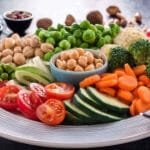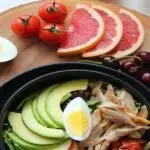Aashu’s Dilemma
Coming from a north Indian family, Aashu has South Indian foods like dosas, idlis & sambar either as breakfast or mid-day snacks but not as a major meal.
There is no doubt that South-Indian dishes are not only delicious & flavorful but they are also nutritious & rich with health benefits. Some major ingredients of the South-Indian diet are coconut oil, curry leaves, rice & sometimes seafood for non-vegetarians.
Aashu wants his mother to add South Indian dishes for dinner and lunch as well. However, she still considers that meals without chapati and pulao can not be nutritious and healthy.
Aashu now once again on the internet to know what are the health benefits of south-Indian foods, their nutrient content & a 7-day south-Indian diet plan.
What is a South Indian Diet?
A South-Indian diet is nothing but a compilation of all those healthy meals that are usually consumed in southern states of India, namely Tamil Nadu, Kerala, Karnataka, Telangana & Andhra Pradesh.
South-Indian cuisine is also balanced similar to other Indian cuisines, to provide you with a package of essential nutrients such as proteins, fats, vitamins & carbs in required quantities.
With the wide use of Indian spices & herbs, the South-Indian diet can make your daily meals flavorful & delicious as well as promote many health benefits.
This diet focuses on the consumption of plant foods that are mostly available in south India but you can even add dairy products that are healthy such as paneer & desi ghee, making it a Lacto-vegetarian diet.
You can also add Indian fish, prawns & shrimp to the meal as South-Indians are regular consumers of seafood. They are a major source of protein for them.
South-Indian cuisine is infamous among Indians for its carbs & fat-rich foods. But then also, you can have weight loss by adhering to traditional south-Indian foods.
South Indian Foods are Well-Balanced
There is no doubt that “the South-Indian diet is well-balanced with all essential nutrients and it can fulfil all your nutritional needs”.
This feature makes this diet quite preferable than any other Western diet, if you need to have weight loss but without compromising on any essential nutrient.
Some of the essential nutrients that can be richly found in South-Indian diet are:
Healthy Fats
Although fats are the primary factor for weight gain, the intake of healthy fats is necessary for the proper development of body & muscles.
Other than this, healthy fats also lower the chances of stroke & heart disease by reducing the level of bad cholesterol (LDL) in our body.
Food groups such as nuts, low-fat dairy & seafood are some primary sources of healthy fats for South-Indian dieters.
Virgin coconut oil & desi ghee which are used as an alternative to vegetable oil, carry great quantities of healthy fats.
Proteins
If you are following a diet with the purpose of weight loss & muscle building then a major part of your meal should be protein-rich foods.
For many, weight loss is not the only meaning of fitness, but they desire to have a well-toned body with proper muscle buildup. In this case, proteins are a good alternative to that of carbs.
In the South-Indian diet, we have foods such as beans, legumes, seafood & low-fat dairy that can provide a lot of protein for muscle development along with weight loss.
Meat & poultry are also a good source of protein but they are also high in calories which can be destructive to your weight loss plans.
Vitamins
As a balanced diet, South-Indian foods can provide you with all sorts of vitamins rather than only some of them.
These vitamins are critical for getting rid of diseases that can occur due to their deficiencies such as night blindness due to deficiency of Vitamin A or Scurvy due to deficiency of Vitamin C.
Other than coping with diseases, Vitamins are also helpful in the physical & mental growth of your body.
Foods such as fruits, vegetables, nuts, seeds, seafood & dairy are all good sources of vitamins A, B, C & E. This means you don’t have to rely on supplements to fulfil your requirements for vitamins.
Seafood & dairy are especially a good source of vitamin B12 which is needed for red blood cell formation & support of bone health.
Fun Facts about Idli

One of the most famous South Indian dishes, Idli is enjoyed throughout India. As per studies of some prominent Food historians, Idli was first prepared in Indonesia and then reached South India through traders.
In some Kannada literary works, it was mentioned as early as 920 A.D. March 30 was declared as World Idli Day by the Tamil Nadu Government in 2015.
What to Eat & What to Avoid
There are no clear guidelines about what foods to include & avoid from South-Indian diet but if your goal is to have weight loss & cut your calorie intake then the following foods should be included:
What to Eat
| Category | Food |
|---|---|
| Fruits | Banana, grapes, apple, oranges, mangoes, custard apple, pineapple, strawberries, pomegranate, papaya, etc. |
| Vegetables | Cauliflower, cabbage, capsicum, spinach, carrot, potatoes, tomatoes, kale, etc. |
| Whole grains | Millets, Barley, Amaranth, Oats, Buckwheat |
| Dairy products | Low-fat milk, skimmed paneer, buttermilk, curd, etc. |
| Beans and legumes | Lentils, black beans, kidney beans, chickpeas, etc. |
| Nuts & seeds | Cashews, Almonds, Walnuts, Pumpkin seeds, Flax seeds, Peanut butter, Pistachios |
| Healthy fats | Virgin coconut oil, olive oil, organic desi ghee, etc. |
| Spices | Turmeric, basil, bay leaf, cinnamon, rosemary, cardamom, cumin, etc. |
| Herbs | Garlic, pudina (mint), spirulina, Ashwagandha, ginger, coriander, ajwain, cloves, black pepper, etc. |
| Natural sweeteners | Organic honey, date paste, coconut sugar, etc. |
| Beverages | Black tea, Black Coffee, Green Tea, etc. |
| Seafood | Indian tuna, Indian mackerel, prawns, shrimps, etc. |
| Dressings | Dark chocolate & apple cider vinegar, etc. |
What to Avoid
South-Indian cuisine has traditionally remained uninfluenced by those foods that are unhealthy & can be the primary cause of chronic diseases. These foods should be excluded:
| Category | Food |
|---|---|
| Animal products | Lamb meat, poultry, beef, egg, etc. |
| Sweets | gulab jamun, barfi, ras malai, etc. |
| Processed foods | ketchup, noodles, pasta, mayonnaise, etc. |
| Oils | Vegetable oil, canola oil, palm oil, etc. |
| Fried snacks | samosas, kachoris, bhujias, etc. |
| Junk Foods | Pizzas, Burgers, Potato chips, French Fries etc. |
Occasional intake is allowed in controlled quantities.
7-day South-Indian Diet Plan
We have designed a sample meal plan based on South-Indian foods that can help you out in weight loss & have other health benefits. We have tried to suggest healthy South-Indian dishes for dinner, lunch, breakfast and even an evening snack.
| As per standards, A man should take 2200 calories & a woman should take 1800 calories a day. |
| Day 1 | Monday |
|---|---|
| Wake up drink | 1 glass of Coconut Water. |
| Breakfast (Men- 600 kcal, Women- 500 kcal) | 3 large Idli (306 kcal) & 1 serving of Sambar cooked in desi ghee (175 kcal) with 2 tbsp of Coconut Chutney (72 kcal). |
| Lunch (Men- 800 kcal, Women- 650 kcal) | 1 serving of Oriental Vegetable Curry (320 kcal) with 3 medium-sized Multigrain Roti (405 kcal). |
| Healthy snack (Men- 250 kcal, Women- 200 kcal) | 1 slices of large Apple (116 kcal) with 1 cup of Buttermilk (99 kcal). |
| Dinner (Men- 550 kcal, Women- 450 kcal) | 1 serving of Spinach Dal (342 kcal) with 1 serving of Tomato Methi Rice (207 kcal). |
| Goodnight Drink | 1 cup of Ashwagandha Tea. |
| Day 2 | Tuesday |
|---|---|
| Wake up drink | 1 glass of Coconut Water. |
| Breakfast (Men- 600 kcal, Women- 500 kcal) | 1 large Dosa prepared in virgin coconut oil (324 kcal) with 1 cup of Onion Tomato Chutney (155 kcal). |
| Lunch (Men- 800 kcal, Women- 650 kcal) | 2 servings of Bendekai Gojju /Okra Curry (270 kcal) with 1 cup of Brown Rice (216 kcal) & 1 serving of Cucumber Salad (50 kcal). |
| Healthy snack (Men- 250 kcal, Women- 200 kcal) | A bowl of fruit salad (155 kcal) with 4 walnuts (104 kcal). |
| Dinner (Men- 550 kcal, Women- 450 kcal) | 1 serving of Vegetable Kadala Curry (329 kcal) with 1 serving of Rice Puttu (223 kcal) . |
| Goodnight Drink | 1 cup of Ashwagandha Tea. |
| Day 3 | Wednesday |
|---|---|
| Wake up drink | 1 glass of Coconut Water. |
| Breakfast (Men- 600 kcal, Women- 500 kcal) | 3 servings of Pesarattu prepared in organic desi ghee (306 kcal) with 2 tbsp of Allam Pachadi (256 kcal). |
| Lunch (Men- 800 kcal, Women- 650 kcal) | 1 serving of Palak/Spinach Dal (325 kcal) with 3 medium-sized Wheat Roti (360 kcal). |
| Healthy snack (Men- 250 kcal, Women- 200 kcal) | 1 large Banana (121 kcal) with 2 dry Dates (110 kcal). |
| Dinner (Men- 550 kcal, Women- 450 kcal) | 1 serving of skimmed Paneer Masala (298 kcal) with 2 medium-sized Multigrain Roti (270 kcal). |
| Goodnight Drink | 1 cup of Ashwagandha Tea. |
| Day 4 | Thursday |
|---|---|
| Wake up drink | 1 glass of Coconut Water. |
| Breakfast (Men- 600 kcal, Women- 500 kcal) | 1 cup of Quinoa Upma (186 kcal) with 1/2 cup of Green-Garlic Chutney (96 kcal) with a glass of Sambharam (80 kcal). |
| Lunch (Men- 800 kcal, Women- 650 kcal) | 1 serving of Chettinad Potato Korma (262 kcal) & 2 servings of Lemon Rice (350 kcal) with curd. |
| Healthy snack (Men- 250 kcal, Women- 200 kcal) | 1 cup of Roasted Makhana (216 kcal). |
| Dinner (Men- 550 kcal, Women- 450 kcal) | 2 servings of Grilled Tuna Steak (530 kcal). |
| Goodnight Drink | 1 cup of Ashwagandha Tea. |
| Day 5 | Friday |
|---|---|
| Wake up drink | 1 glass of Coconut Water. |
| Breakfast (Men- 600 kcal, Women- 500 kcal) | 1 serving of Cherupayar Thoran (298 kcal) & 2 medium-sized Palak/Spinach paratha with organic desi ghee (266 kcal). |
| Lunch (Men- 800 kcal, Women- 650 kcal) | 1 serving of Pattani Kuzhambu (383 kcal) prepared in virgin coconut oil with a bowl of Paneer Fried Rice (337 kcal). |
| Healthy snack (Men- 250 kcal, Women- 200 kcal) | 1 cup of Roasted Sweet Potato (150 kcal) & 1 glass of Buttermilk (99 kcal). |
| Dinner (Men- 550 kcal, Women- 450 kcal) | 2 medium-sized Kati Rolls (376 kcal) with 1 bowl of Tomato Carrot Soup (90 kcal). |
| Goodnight Drink | 1 cup of Ashwagandha Tea. |
| Day 6 | Saturday |
|---|---|
| Wake up drink | 1 glass of Coconut Water. |
| Breakfast (Men- 600 kcal, Women- 500 kcal) | 1 serving of Wheat Idiyappam (245 kcal) with 1 serving of Garlic Rasam (60 kcal) & 1 glass of Sweet Coconut Milk (142 kcal). |
| Lunch (Men- 800 kcal, Women- 650 kcal) | 1 serving of Fish curry (406 kcal) with 1 serving of Jeera Rice (246 kcal) & 100g of Curd (98 kcal). |
| Healthy snack (Men- 250 kcal, Women- 200 kcal) | 1 Ounce of Pumpkin seeds (126 kcal) with 1 medium-sized Papaya (119 kcal). |
| Dinner (Men- 550 kcal, Women- 450 kcal) | 1 serving of Veg Korma (233 kcal) with 2 medium-sized Multigrain Roti (208 kcal). |
| Goodnight Drink | 1 cup of Ashwagandha Tea. |
| Day 7 | Sunday |
|---|---|
| Wake up drink | 1 glass of Coconut Water. |
| Breakfast (Men- 600 kcal, Women- 500 kcal) | 1 serving of Rava Pongal (417 kcal) prepared in almonds with 1 serving of Coconut Chutney (138 kcal). |
| Lunch (Men- 800 kcal, Women- 650 kcal) | 1 serving of Mamidikaya Pappu (379 kcal) prepared in organic desi ghee with 1 serving of Veg Fried Rice (336 kcal). |
| Healthy snack (Men- 250 kcal, Women- 200 kcal) | 1 glass of Strawberry Chia Seed Pudding (221 kcal). |
| Dinner (Men- 550 kcal, Women- 450 kcal) | 1 serving of Prawn Biryani (585 kcal) with 100g of Curd (98 kcal). |
| Goodnight Drink | 1 cup of Ashwagandha Tea. |
Health Benefits of South Indian Cuisine
Other than weight loss, you can enjoy many different health benefits by strictly adhering to a South-Indian diet. However, we have very limited research on the health-related benefits of South Indian Foods.
Lowers Blood Pressure
High blood pressure is one of the reasons for many premature deaths in India & the count can be in the millions annually.
Traditionally, Indians remained immune to high blood pressure but the advent of Western foods & unhealthy lifestyles has changed the pendulum.
Foods especially meat, vegetable oils, junk & processed foods are rich in bad cholesterol (LDL) which is primarily responsible for high blood pressure.
South- Indian diet can effectively lower the numbers of both systolic & diastolic blood pressures as it emphasizes the consumption of plant foods that are good in lowering bad cholesterol.
Virgin coconut oil & desi ghee are rich in good cholesterol (HDL) which strengthens the blood vessels & helps in lowering high blood pressure.
Protects from Heart Diseases
Cardiovascular diseases such as heart attack & strokes are becoming more & more common among the Indian population due to wrong eating habits & unhealthy lifestyles.
Some studies have shown that a person with a vegetarian diet is 15% less likely to have heart disease compared to those with a non-vegetarian diet.
South-Indian diet can help you in tackling the risk of heart disease as it focuses on the consumption of plant foods while avoiding the intake of high-calorie animal foods & processed foods.
Foods especially nuts & seeds are good for the heart as they help in the repair of damaged heart tissues.
Seafood is rich in Omega-3 fatty acids that are essential for a healthy heart as it helps in lowering the inflammation that can damage the blood vessels & result in a heart attack.
Controls Blood Sugar
Type-2 diabetes can be lethal for your health as it can damage your eyes & kidneys as well as cause sexual problems in adults.
Type-2 diabetes can arise due to high blood sugar levels which are primarily caused due to insulin resistivity & improper functioning of the pancreas.
A diet high in calories & sugar, as well as an unhealthy lifestyle, can lead you to the condition of type-2 diabetes.
Recent research has proved that cutting your intake of table sugar, animal products & processed foods by 50% can reduce your risk of high blood sugar by 7-8%.
South-Indian foods can help you control your blood sugar by lowering insulin resistivity & nourishing the pancreas for proper functioning.
Organic honey & coconut sugar can be used as an alternative to table sugar & virgin coconut oil can be used in place of vegetable oil. These foods are low in calories & can reduce the risk of type-2 diabetes.
Important Note
To boost your metabolism & fast digestion, we are recommending some healthy tips. You can adopt anyone of them for better results:
- Take 2 tablespoons of organic desi ghee in the morning on an empty stomach.
- Soak 2 tablespoons of fenugreek seeds overnight & take in the early morning.
- Drink lime water with 1 tablespoon of organic honey in the morning.
Conclusion
South-Indian diet is a compilation of all healthy foods that are especially consumed in South India. It is a form of a traditional diet that can be adopted for a lifetime.
Aashu now has enough information about South-Indian cuisine to prove that it is well-balanced with all essential nutrients. You don’t need to rely on supplements for any nutrient requirement.
Other than weight loss, you can also have multiple health benefits from strictly adhering to the South-Indian diet. It can control your blood sugar, lower blood pressure & reduce the risk of heart disease.
Although primarily focused on plant foods, the South-Indian diet also allows the inclusion of seafood & dairy, making it easy for purely non-vegetarians to adhere to it.




